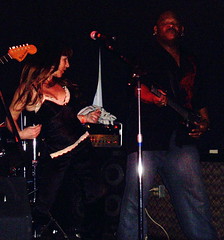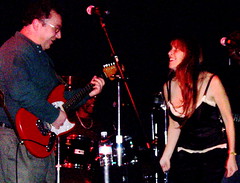Brokeback Mountain
There's so much to love about this film. First off, the landscape is captured beautifully. The majesty of nature is one reason we'll never lose the theatrical experience for movies. Seeing this film definitely made me long for the time I spent in Montana & Idaho. For all this film is to so many, for me, it's a film about contrasting attitudes and approaches to life. Jack wants to feel his life, be himself, have courage and boldness toward life, take chances. Ennis was traumatized by his father as a child and lived the rest of his life in fear and denial, never knowing what to do with his emotions and needs.
It's almost amazing to me that the Oscars so often get it right. It's such a political game that films, particularly indies, hire year-round Oscar consultants. We are a busy nation, a busy world, and most of us have only enough attention to pay to a few big winners. There are millions of incredible athletes out there we'll never know about because they don't have a gold medal and thousands of great films we'll never discover. So, producers will do almost anything to break the waves. The Brokeback Mountain screenplay, written by the revered best-selling western author Larry McMurtry and Diana Ossana, was known for many years in Hollywood as the best screenplay never made.
Producers were as afraid of homosexuality as Ennis was. McMurtry said when he read Annie Proulx's short story in the New Yorker, his first reaction was that he wished he'd written it. How had he missed such an obvious facet of the west when he'd written about it all his life? I mean, guys up on mountains alone for months.... But, more than that, I think this is a story a lot of authors missed because it's a twist (pun intended) on a classic fable. The progeny of Romeo & Juliet and West Side Story show young lovers willing to face a small-minded, prejudiced family and society... together. It's the kids against the parents, so to speak.
This is the classic fable modernized, we're now ready to see what it looks like when there's only one real protagonist and he has to, essentially, fight not only a culture frightened of its sexuality, or anything different, but his lover, who embodies more buckling than bravery. This makes Jack all the more courageous and ahead of his time, or maybe it just shows his desperation or naivete. Jack has a focus and desire to be himself that guides his life and will not be silenced. Like Gwen Aruja, the transsexual killed several years ago, he insisted on authenticity and paid for it with his life. They are martyrs, they brought awareness and change, and emboldened others. They're heroes.
It's funny cause even though we're all waiting for the big sex scene, when it comes, it's both shocking and natural at the same time. Man, that's a lot of testosterone. No wonder people find lesbians easier to swallow. I must say, this is one film that, watching it on the small screen, I really longed for a bigger one. When it comes to Heath and Jake romping in the Rockies, bigger is better, and much bigger is much better. Let's get some IMAX in here.
But, I digress. Here's why I think this is a great story, I said it up top, it shows the contrast between a brave man and a coward. Yeah, the bold one gets his face bashed in and the scared little mouse faces his small unlived life for many years, but, who do you sympathize with here? Who do you admire? Jack loved. He lived his life, rode horses he loved and wanted to live his life with a man he loved. He loved Ennis. I totally related to him when he said the line that's already become a cliche, "I wish I could quit you". I've been there, loving someone I wish I didn't. But there's satisfaction in knowing that you are living your life in a full, deep and feeling way and that you can be honest about it.
Someone said to me once that in the end, it's all about the love we felt. Jack was able to feel love. Was Ennis? What did love feel like to Ennis? Did he, in fact, love Jack Twist? In many ways, that's the intriguing "twist" to this film. When we look at Jack, it's clear, he has a certain integrity, despite living, basically, a lie with his wife. Ennis is cloudy. We never know quite who he is or how he feels. Something got turned off, way down, way deep, very early and I get the feeling no one will ever really know Ennis, including himself. Who is this guy? What does his life stand for? What does his life mean? He is just existing. He doesn't want awareness. His life is a process of shutting down.
He loves his daughter and, through knowing Jack, he musters up enough love for her to show up at her wedding, or at least promises to. Now we clap and that endless guitar loop comes up bigger than ever. Ennis smiles at his daughter and agrees to go to her wedding. Wow, what growth. I think of characters like Celie in Color Purple, or even many of the characters in Crash. Maybe Annie Proulx should have thought of that before making all those tacky comments about Crash. I think if anything shortcuts the film, it's the story and character development. We see the emotion come out of Ennis as, literally, retching. So, it's a realistic ending for such a sad, empty man, but, I guess we expect more out of our big Hollywood movies these days.
It's almost amazing to me that the Oscars so often get it right. It's such a political game that films, particularly indies, hire year-round Oscar consultants. We are a busy nation, a busy world, and most of us have only enough attention to pay to a few big winners. There are millions of incredible athletes out there we'll never know about because they don't have a gold medal and thousands of great films we'll never discover. So, producers will do almost anything to break the waves. The Brokeback Mountain screenplay, written by the revered best-selling western author Larry McMurtry and Diana Ossana, was known for many years in Hollywood as the best screenplay never made.
Producers were as afraid of homosexuality as Ennis was. McMurtry said when he read Annie Proulx's short story in the New Yorker, his first reaction was that he wished he'd written it. How had he missed such an obvious facet of the west when he'd written about it all his life? I mean, guys up on mountains alone for months.... But, more than that, I think this is a story a lot of authors missed because it's a twist (pun intended) on a classic fable. The progeny of Romeo & Juliet and West Side Story show young lovers willing to face a small-minded, prejudiced family and society... together. It's the kids against the parents, so to speak.
This is the classic fable modernized, we're now ready to see what it looks like when there's only one real protagonist and he has to, essentially, fight not only a culture frightened of its sexuality, or anything different, but his lover, who embodies more buckling than bravery. This makes Jack all the more courageous and ahead of his time, or maybe it just shows his desperation or naivete. Jack has a focus and desire to be himself that guides his life and will not be silenced. Like Gwen Aruja, the transsexual killed several years ago, he insisted on authenticity and paid for it with his life. They are martyrs, they brought awareness and change, and emboldened others. They're heroes.
It's funny cause even though we're all waiting for the big sex scene, when it comes, it's both shocking and natural at the same time. Man, that's a lot of testosterone. No wonder people find lesbians easier to swallow. I must say, this is one film that, watching it on the small screen, I really longed for a bigger one. When it comes to Heath and Jake romping in the Rockies, bigger is better, and much bigger is much better. Let's get some IMAX in here.
But, I digress. Here's why I think this is a great story, I said it up top, it shows the contrast between a brave man and a coward. Yeah, the bold one gets his face bashed in and the scared little mouse faces his small unlived life for many years, but, who do you sympathize with here? Who do you admire? Jack loved. He lived his life, rode horses he loved and wanted to live his life with a man he loved. He loved Ennis. I totally related to him when he said the line that's already become a cliche, "I wish I could quit you". I've been there, loving someone I wish I didn't. But there's satisfaction in knowing that you are living your life in a full, deep and feeling way and that you can be honest about it.
Someone said to me once that in the end, it's all about the love we felt. Jack was able to feel love. Was Ennis? What did love feel like to Ennis? Did he, in fact, love Jack Twist? In many ways, that's the intriguing "twist" to this film. When we look at Jack, it's clear, he has a certain integrity, despite living, basically, a lie with his wife. Ennis is cloudy. We never know quite who he is or how he feels. Something got turned off, way down, way deep, very early and I get the feeling no one will ever really know Ennis, including himself. Who is this guy? What does his life stand for? What does his life mean? He is just existing. He doesn't want awareness. His life is a process of shutting down.
He loves his daughter and, through knowing Jack, he musters up enough love for her to show up at her wedding, or at least promises to. Now we clap and that endless guitar loop comes up bigger than ever. Ennis smiles at his daughter and agrees to go to her wedding. Wow, what growth. I think of characters like Celie in Color Purple, or even many of the characters in Crash. Maybe Annie Proulx should have thought of that before making all those tacky comments about Crash. I think if anything shortcuts the film, it's the story and character development. We see the emotion come out of Ennis as, literally, retching. So, it's a realistic ending for such a sad, empty man, but, I guess we expect more out of our big Hollywood movies these days.

